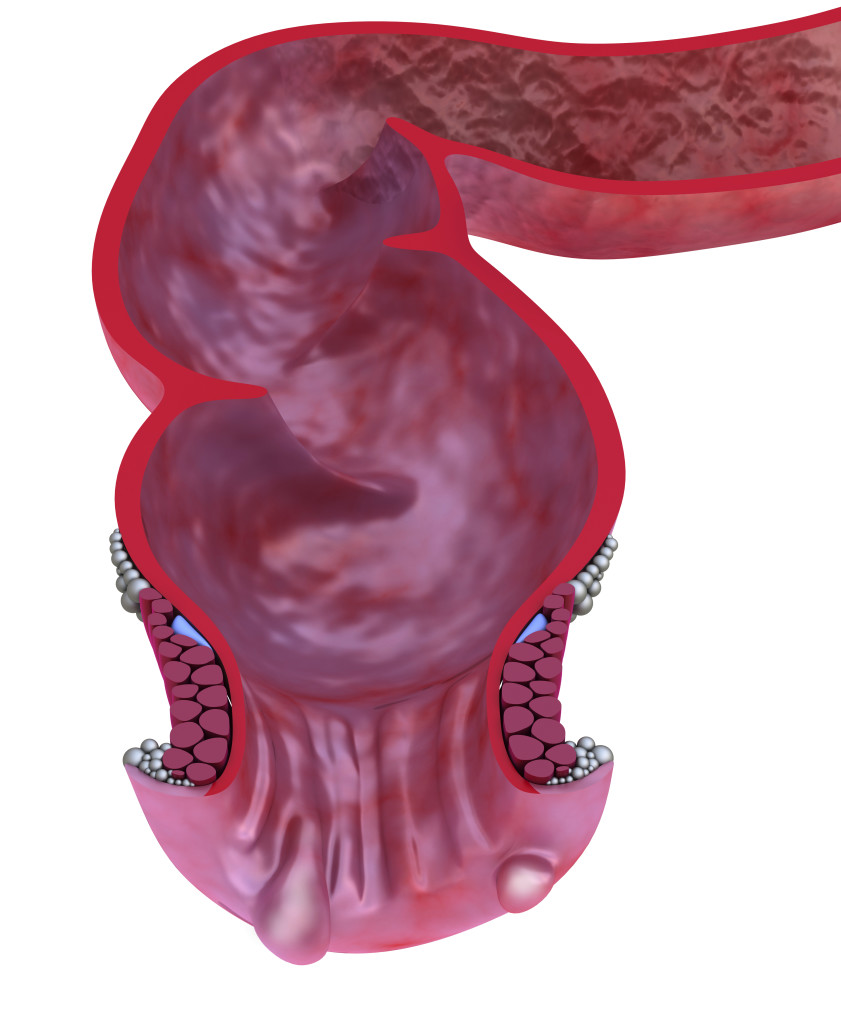Hemmorrhoids
Hemorrhoids are swollen and inflamed veins around the anal canal or rectum. Though hemorrhoids are often not serious, they are a common problem that can become uncomfortable and painful if not treated. The rectum leads to the anus and completes the final stage of the digestive tract, so hemorrhoid symptoms often become evident during bowel movements. If you have noticed discomfort, like anal itching or blood in your stool or on your toilet paper, this may be the first sign of hemorrhoids. If you are concerned you may have hemorrhoids and are interested in hemorrhoid treatment, contact Dr. Peyton Berookim at Gastroenterology Institute of Southern California for more information on diagnosing and treating hemorrhoids.

Who Gets Hemorrhoids?
Approximately 75 percent of people will have hemorrhoids at least once in their life. Pregnant women and adults over 45 are more likely to have hemorrhoids. If you are suffering from hemorrhoids, know that you are not alone! In general, hemorrhoids are caused by swelling in the anal or rectal veins resulting from several factors.
Swelling is often caused by:
- Lack of fiber in diet
- Chronic/frequent diarrhea
- Chronic/frequent constipation
- Strained bowel movements
- Pregnancy and labor
- Weight gain or excess weight in the abdomen or pelvis
- Medical conditions like heart and liver diseases
If you suffer from gastrointestinal issues like frequent diarrhea/constipation or strained bowel movements, talk to your gastroenterologist about improving your digestive health. An experienced GI doctor, like Dr. Berookim, will treat your diarrhea, constipation, or other bowel issues and help you avoid hemorrhoids.
Diagnosing Hemorrhoid Symptoms
A doctor will be able to confirm if you have hemorrhoids and whether they are external or internal. You should contact your doctor if you notice the symptoms of hemorrhoids, as they can also be symptoms of more serious health issues. The most common sign of hemorrhoids is bright red blood in your stool, in your toilet bowl, or on your toilet paper. Internal hemorrhoids that have not prolapsed are typically not painful, so checking your stool for blood may be the only way to notice if you have symptoms. Prolapsed hemorrhoids can cause pain, anal itching and other discomfort. External hemorrhoids may form blood clots that bleed and cause painful swelling. If you have any of these symptoms, you should definitely see your specialist. Your GI doctor will be able to determine the size and type of your hemorrhoids and choose the best treatment option for you. Your diagnosis will be based on your medical history and a physical exam, followed by a digital rectal exam and possibly an anoscopy. You doctor may perform other tests to make sure that you are not at risk for other issues like colorectal cancer. Once you are diagnosed, your doctor will develop the best treatment plan for your specific hemorrhoids.
Hemorrhoid Treatment
Hemorrhoid treatment varies depending on whether the hemorrhoids are internal or external and their level of severity. Lifestyle changes may assist in relieving symptoms over the long term. Incorporating whole grains, fruits, and vegetables into your diet helps ensure a healthy digestive tract. Staying active with a moderate level of exercise will also help maintain your weight and keep your bowels moving.
In mild cases, medicine and ointments can be applied to the hemorrhoids. If you experience mild pain as a result of your hemorrhoids, taking a nonprescription pain reducer like ibuprofen or Tylenol may be beneficial. If your hemorrhoids are mild, ointments that protect the skin and suppositories like Preparation H are a helpful combination to prevent and treat hemorrhoids.
Typically hemorrhoids do not require surgery. However, if other treatments have failed to provide relief, hemorrhoid removal is an effective course of action. A hemorrhoidectomy may be required in severe cases of large hemorrhoids. Typically, external hemorrhoids do not need to be removed. Surgery is more likely to be suggested for internal hemorrhoids since they are more difficult to treat with medication.
Contact Your GI Doctor
Interested in hemorrhoid treatment or prevention? You are in good hands with your GI doctor, Dr. Berookim. Hemorrhoids are a common and easily treatable issue that you do not have to suffer through any longer. Contact Gastroenterology Institute of Southern California for a consultation. Call (310) 271-1122 to schedule your appointment today!

